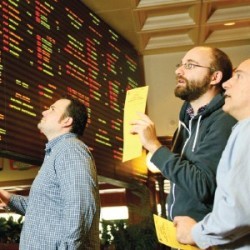Sports Betting Big Business for Delaware

Sports betting is becoming a hot topic in the gambling industry, as more and more professional leagues are speaking out in favor of allowing legal betting on games. The one holdout that remains is the NFL, but one state that is already profiting from betting on professional football games is Delaware. Although legal sports betting is still relatively new in the state, it is already showing signs of becoming a profitable source of revenue.
Financial Impact of Sports Betting in Delaware
Last year, First State residents and out-of-staters who visited Delaware spent $38 million betting on NFL games. So far, the 2015 and 2016 NFL season has been an even busier time for betting. Revenues from betting is up 9 percent, and representatives from the Delaware State government are anticipating some $7 million in tax revenue from sports betting; that’s five times the amount that was collected in the first year after it was legalized.
“That’s $7 million we didn’t have before. That funds a lot of school teachers and cops,” explained Delaware Finance Secretary Tom Cook.
While the numbers are promising, it’s important to put them into perspective. Sports betting is still only bringing in about 3 percent of the total amount of tax revenue raised by gambling. Slot machines continue to remain on top, even though the revenue generated by them has decreased by about 36 percent since 2010. In 2014, the state still received $136 million in tax revenue from slot machines.
Delaware casinos are also seeing an increase in revenues from sports betting. There is no doubt that they are glad for that, as the brick and mortar operations in the state have been struggling as casinos have opened up in border states, keeping gamblers who once took vacations to Delaware playing the slots and table games at home. As Harford Community College gaming expert James Karmel explains:
“There has been increasing popular momentum for allowing more sports betting around the country. And that 1992 law cuts against the grain of the popular mood at this time, I think. Overall this is connected to the ubiquitous nature of the casinos now. The culture is realizing you can bring in legalized gambling even in non traditional forms and it doesn’t ruin your community.”
Movement Towards Sports Betting Expansion
With many US states suffering state budget deficits, it’s no wonder many industry experts believe that a sports betting push will inevitably gain momentum in the the country. Nevada generates $4 billion annually from sports bets, while offshore operators and illegal sites are estimated to account for between $50 to $400 billion in revenues each year. Up until recently, however, major sports leagues vehemently opposed any attempts to expand sports betting stateside, but there has since been a u-turn in the stances of the NBA, MLB and NHL, who now all seem to approve of a a federally-regulated sports betting industry. As NBA commissioner Adam Silver wrote in a New York Times op-ed column in November:
“Times have changed since PASPA was enacted. Gambling has increasingly become a popular and accepted form of entertainment in the United States. Most states offer lotteries. Over half of them have legal casinos. Three have approved some form of Internet gambling, with others poised to follow. There is an obvious appetite among sports fans for a safe and legal way to wager on professional sporting events.”
About NFL Gambling in Delaware
So how exactly does sports betting work in Delaware? Initially, the state had hoped to allow for single bets on individual games, similarly to the way that wagers are placed in Las Vegas. Unfortunately, Delaware lost a 2009 court case that would have allowed for such a move with a court upholding the 1992 federal ban on sports betting.
In order to get around the regulations, Delaware has instituted a sports betting program in which gamblers must bet on at least three games. To be a winner, it is necessary to win every game that a player wagers on. Bets can be placed in any of Delaware’s three casinos. In 2012, the Delaware legislature voted in a law that allows for sports betting to take place at 102 retail locations as well. As a result, Delaware residents and those visiting the state can place bets at gas stations, restaurants and bars that participate.
Currently, Delaware’s Department of Justice and Finance Department are conducting a study of fantasy sports betting in an attempt to decide whether or not the products offered by sites such as FanDuel and DraftKings should be considered gambling. It’s possible that in the near future, the sites may be subject to a higher rate of taxation, opening the door to increased tax revenue from fantasy sports betting in addition to traditional sports betting.










